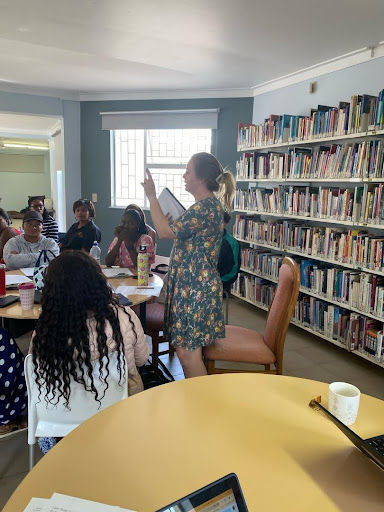Learning Outside of the Classroom
- Windhoek International School
- Mar 29, 2024
- 4 min read
A long outline of some Outdoor Education opportunities our students are fortunate to experience.

In the past weeks, and across the year, our students have had many opportunities to learn outside of the classroom. Our Outdoor Education programme, led by Forrest Donoho, is well structured and intentionally aims at students learning and applying skills that often take them out of their comfort zones.
Being able to experience situations outside of our usual daily routine, is an outstanding opportunity for real-life learning and getting to know ourselves in different ways.
There is substantial evidence to indicate that adequately planned and well-taught outdoor education curricula can have a positive effect on student outcomes, including educational, interpersonal, social and critical thinking skills, as well as mental and physical health.
“Quality outdoor education can:
enhance inquiry, critical thinking and reflection skills
make significant contributions to literacy and numeracy
increase students’ sense of confidence and efficacy
improve mental health and well-being and increase physical health in young people
improve environmental knowledge and an understanding of culture, heritage and place history
teach students to assess risk and make judgments about risk management.
The benefits of outdoor education also extend to teachers and include improved relationships with students and personal development in their teaching practice.
The 2015 independent evaluation of the Learning Away initiative in the UK found that well-designed and delivered residentials can improve outcomes as follows:
Short and medium term: enhanced relationships, improved engagement and confidence in learning, and new and developing skills and understanding.
Longer-term: improved achievement, knowledge and skills, improved relationships, a greater sense of belonging, raised aspirations, and more successful transition experiences. (Outdoor Education Schools)
Our students will attest to these benefits and learnings during their experiences at field trips and excursions.

Currently, a group of Grade 9 - 11 students are on a two-week trip to the Okavango Delta completing a field guide training.
About two hours outside of Maun, students will be engulfed in a truly wild experience having the opportunity to see a lion, elephant, buffalo, leopard, cheetah, and many other animals. These animals are unique in that they are not habituated to humans. Some might not have ever seen humans before!
During these two weeks, students will be working towards their Nature Guide Level II certification. This means that we will be doing game drives and walks every day as well as lessons on flora and fauna, astronomy, geography, and more. When students turn 18 years old, they can return for another two weeks to complete the driving section of the certification, pass the examinations, and become real guides through the Botswana Qualifying Authority!
This experience is not only about earning a guiding qualification. Spending two weeks in the Delta has the potential to also improve students’ chances of university entrance, provide direction for Internal Assessment and Extended Essay research, and in general, facilitate deeper interest in the natural world. (Excerpt from the letter sent to parents and students at the start of this endeavour).

Four of our Grade 9 students have just completed an exchange visit to the US, France and Australia where they were hosted by families of partner schools. Once again, this was a life-changing experience for our students, some of whom have never before travelled on their own. Feedback from returning students and our partner schools has been overwhelmingly positive - connections made for life, experiences that will be life memories, and an opportunity for personal growth are huge benefits of this programme.
In the coming week, we will be welcoming these partner school’s peers at WIS for them to experience something new and unknown in a country distinctly different in its climate and culture to their own.
In June, our Grade 10 students will have the opportunity to visit Damaraland and research and learn about Elephant Human Relation Aid (EHRA) in a real-life scenario. Once again, they will be able to work on topics that are real to the Namibian context and support conservation efforts.

“Elephant-Human Relations Aid (EHRA) Namibia has helped build peaceful relationships between free-roaming desert elephants and local communities in Namibia, Africa since 2003. Conflict exists due to shared land, resources and an ongoing drought in the region, which leaves communities and animals without much food or water. Elephants, livestock and humans share the same water points, which not only sparks conflict but also results in human and elephant fatalities.
EHRA’s mission is to implement practical solutions that help combat elephant-human conflict, and thereby secure a future for Namibia’s desert elephants. We do this by building protective walls around waterpoints, educating locals on conflict mitigation tactics, and continuously monitoring of the different elephant herds. Please help us fund our conservation work so that we can continue monitoring elephants and helping rural communities. Find out more here." (EHRA)
(Credits go to Mr. Forrest Donoho for the incredible photos sent to us during the Okavango Delta trip).
And as a very special treat, WIS is very fortunate to host Karlis Bardelis on 9 April 2024 at 18:00. Karlis has travelled the world rowing and cycling since 2016. He departed from Lüderitzbucht (in southern Namibia), cycled and rowed around the world and is now on his last stretch back to Lüderitzbucht to complete the full circle around the world. Please join us in hearing about his learning journey around the world in the last 8 years.
Karlis Bardelis in Home Stretch to Complete Circumnavigation “Karlis Bardelis has begun the final 5,000km of his human-powered, round-the-world journey. He is cycling from Kilifi, Kenya to Lüderitz in Namibia, the place where he first hit the road eight long years ago. The Latvian adventurer thought he would have completed this final stage by now. But then, in January 2022, he began a 10,000km row from Malaysia to Tanzania. When he made it to Africa, he became the first known person to row from Asia to Africa. Unfortunately, he did not land in Tanzania. Stronger winds than he had expected than he had expected pushed him too far north. He hit the East African coastal current and ended up landing in ever-dangerous Somalia in June 2022.”  |
Maggie Reiff








Comments